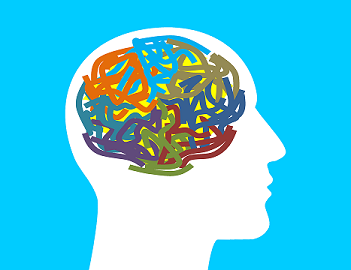
Mental Illness in School and How to Help
November 17, 2021
Schools were established long before things like Attention Deficit Hyperactivity Disorder, Anxiety, Depression, Autism, Bipolar, and a plethora of other mental disorders were even thought of. Of course, they’ve always been around, but a new wave of awareness started only years ago.
Schools are adapting to the idea of different learning styles, that different things work for different people. No two students are the same, and many, if not most, are still being taught in ways that don’t work well for them.
Ryan Honick says, “I don’t know who needs to hear this, but the ‘I never let my disability/pain/illness stop me’ is an ableist and harmful narrative. Sometimes chronic issues are debilitating and they do stop you. And you shouldn’t be made to feel guilty about it.”
While many more common illnesses might not stop someone from succeeding, they still affect them in big ways. This article covers some of those ways.
School isn’t easy for anyone, but mental illness adds even more of a challenge. “[Anxiety] affects my focus because it affects what I’m thinking about in class. I’m panicking about panicking. It definitely affects the quality of my school work,” says Brayke Lindley, a Junior at Davis High School.
Hailey Heaps, also a DHS Junior, says, “Sometimes it’s like I’m not even there, my mind is just so focused on other things, so I can fall behind. It’s hard because it feels like I am just constantly playing catch up.”
With assignments and deadlines from so many classes, falling behind at some point or another is not uncommon. When you regularly miss anywhere from a few minutes to a few days due to mental difficulties, it’s almost impossible not to.
This leaves a big question. How do we change things? We can’t just snap our fingers and vanish the distractions from our brains. We can’t just stop giving assignments. Teachers can’t read their students’ minds, and students are often too nervous to ask for help.
There may be no instant fix, but there are still ways teachers and other students can assist each other. “It helps when people are patient with me. Sometimes I’ll be so focused on something else that it takes me a little longer to catch on to things.” – Heaps.
When a teacher gives a lecture and, upon finishing, a student asks about something they just covered, it is reasonably difficult not to get annoyed. There will always be the people who are only asking to poke fun and gain attention, or who aren’t listening because they don’t care, but chances are that they aren’t trying to be rude.
When a question is met with anger or frustration, it can result in guilt, embarrassment, and hurt. Comments like “just focus,” or “just calm down,” don’t do anything, aside from adding frustration. Try to distance yourself from the situation and think about it from all sides. Annoyance may be a justifiable response, but it hardly helps.
A little patience can go a long way. If we can just take a deep breath and zoom out of our heads, we can make a big difference.
Remaining calm helps students with mental illnesses feel more safe in the classroom and more comfortable asking questions. Better understanding leads to a better education and a better learning environment.